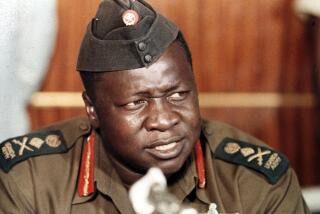Umaru Yar’Adua dies at 58; Nigerian president
- Share via
Reporting from Johannesburg — Nigerian President Umaru Yar’Adua, who died Wednesday night at 58, was a leader with the giant ambition of dragging Africa’s most populous nation from a backward, corrupt state to an advanced global power.
He was too ill and politically weak to attack the entrenched corruption of a venal political elite – or to solve Nigeria’s severe infrastructure problems, particularly in the electricity sector.
Yar’Adua, who had suffered a kidney ailment since the 1990s, had not been seen in public since travelling to Saudi Arabia in November for treatment for pericarditis, or inflammation of the sac around the heart. He returned in February and died at his home in the capital of Abuja.
Even when he came to power in 2007, Yar’Adua had to brush off doubts about his health. His prolonged illness created a political vacuum, after he failed to formally hand over power to his deputy, Goodluck Jonathan.
Jonathan assumed executive powers in February after a vote of the legislature.
Yar’Adua was a contradictory figure: He came to power professing integrity and honesty – through elections rejected by observers as fraudulent. He called for openness and transparency, yet his personal political style was wooden and opaque.
He promised at his inauguration to be a humble “servant leader” of Nigeria’s ethnically diverse population of 150 million. He vowed to push through reform and “respect for the rule of law,” a phrase that became his mantra. It was the first transfer from one civilian leader to another since independence from Britain in 1960, an important moment for Nigerian democracy that was undermined by the blatant ballot stuffing, theft of ballot boxes and intimidation.
Born in 1951 in the northern city of Katsina, Yar’Adua
was from an elite Muslim political family. His father was minister for Lagos in the first government after independence. His older brother, the late Gen. Shehu Musa Yar’Adua, was second in command under the military government of Olusegun Obasanjo in 1976-1979.
A graduate of Ahmadu Bello University in chemistry and education, Yar’Adua was a college lecturer in the 1970s and became general manager at his brother’s farm in Katsina in 1983. He was elected governor of Katsina state in 1999.
Obasanjo, who served two terms as a civilian president for eight years until 2007, handpicked Yar’Adua after unsuccessfully pushing for a third term as president.
Despite his unassuming nature, Yar’Adua asserted his independence from Obasanjo.
When he became president, he took over a chronically badly governed nation. Billions of dollars in Nigeria’s oil wealth had been stolen over the decades by successive generations of corrupt politicians while the population remained in poverty. Nigeria has consistently been named by the watchdog agency Transparency International as one of the world’s most corrupt nations.
Corruption and violence seep through every aspect of daily life, from police demanding bribes from drivers, university degrees that are bought and sold, thuggery and gangsterism on campuses and police killings of innocent people.
While his anti-corruption drive never really took off, his biggest achievement was restoring relative peace in the troubled oil-rich Niger Delta, crucial for Nigeria, the eighth-largest oil exporter in the world. He offered an unconditional amnesty to rebels who had been launching attacks on oil facilities, stealing oil and kidnapping oil workers. The rebellion cut oil output in Nigeria by about a third.
Yar’Adua also launched a crackdown on fraud and mismanagement in the banking sector. He introduced ambitious and long-needed legislation to reform Nigeria’s corrupt and opaque oil sector, opening the state oil company to commercial competition and offering Niger Delta communities a 10% stake in Nigerian joint ventures with foreign oil companies.
But his push for wider reform was frustrated by the corrupt reality of Nigerian politics and the ruling party he led, based on nepotism and patronage.
Wole Soyinka, a Nobel-winning writer and government critic, said Yar’Adua was an innocent, tragic figure who was manipulated and used by his cronies.
“What passes for the Nigerian nation is nothing more than a tragic arena, and Yar’Adua is only the latest tragic figure,” Soyinka said. “The vampires, including those within his own family, turned him into a mere inert resource for their diabolical schemes.”
Yar’Adua’s survivors include his wife, Turai, their seven children and two children with his second wife, whom he divorced.
More to Read
Sign up for Essential California
The most important California stories and recommendations in your inbox every morning.
You may occasionally receive promotional content from the Los Angeles Times.













